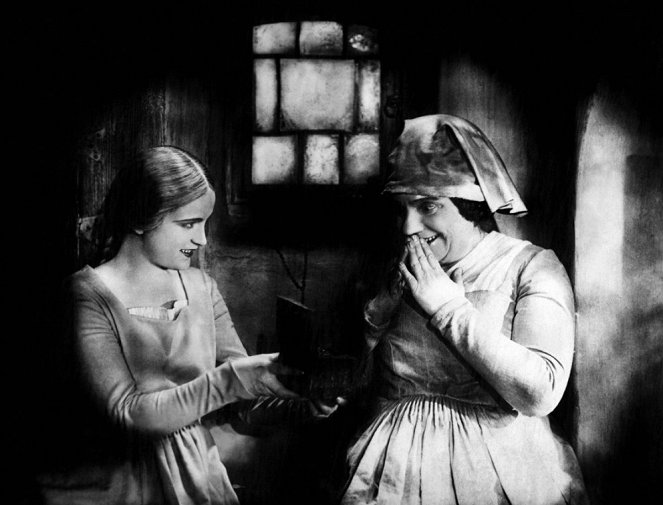Regie:
Friedrich Wilhelm MurnauKamera:
Carl HoffmannBesetzung:
Gösta Ekman, Emil Jannings, Camilla Horn, Wilhelm Dieterle, Werner Fuetterer, Hertha von Walther, Frida Richard, Eric Barclay, Emmy Wyda (mehr)Inhalte(1)
F. W. Murnaus Faust hat eine lange Vorgeschichte, die sich zwischen Berlin und Hollywood abspielte. Tatsächlich hatte Ernst Lubitsch 1923 Mary Pickford zu einem Faust-Film überredet, der aber über Testaufnahmen für die Besetzung der Rolle des Mephisto nicht hinausgekommen ist. Als ein Jahr später die Ufa ihr Faust-Projekt vorstellte, stand als einziger Darsteller Emil Jannings als Mephisto fest. Für die anderen Rollen versuchte man vergeblich, amerikanische Stars zu verpflichten. Noch vor der Fertigstellung von Faust reiste Murnau nach Hollywood ab. Die Ufa gewann Literaturnobelpreisträger Gerhart Hauptmann als Verfasser für die Zwischentitel, traute sich dann aber nicht, sie zu verwenden. (Edition Filmmuseum)
(mehr)Videos (1)
Kritiken (4)
Der letzte deutsche Film von Murnau ist schön. Schon zum Zeitpunkt seiner Entstehung schien er archaisch, aber in Wirklichkeit ist er damals wie heute aktuell. Verspielt und diabolisch. Formal so kreativ, dass man in jeder Szene einen anderen tollen Trick oder zumindest eine überraschende Komposition erwarten muss. Dieses spektakuläre Erlebnis ist ein Beispiel für die kollektive Arbeit eines außerordentlich talentierten Teams von Menschen, vor denen oft fast sofort Hollywood stand und die anderen noch viele Jahre lang außergewöhnliche europäische Arbeit leisten sollten. Jeder Name ist ein Begriff und eine eigene starke Geschichte. Jannings' Mephisto ist in jeder Geste und Mimik königlich, komplettiert von den besten Kostümen. Fuetterers Erzengel ist ein guter Sekundant von Jannings königlichem Spiel. Die Titelfigur von Ekman ist die Interpretation, mit der alle anderen Transkriptionen immer verglichen werden. Hornes Gretchen ist nicht nur ein Symbol der gedemütigten Tugend, sondern eine reale Person voller Hoffnung, die nur Schmerz und Tod kennt. Dieterle Valentin ist ein toller Typ. Wenn ich ein Beispiel für einen Film nennen soll, der dort die Augen öffnen soll, wo das einzige Synonym für Stummfilm die wenig schmeichelhafte Vorstellung des Grotesken ist, dann würde ich auf jeden Fall Faust - Eine deutsche Volkssage empfehlen.
()
I stood by my three stars the whole time because of the miscast character of Mephistopheles (who just reminded me of Postránecký here) and the skipping of the storyline from depressing horror to almost romantic comedy, but the depressing ending and the kiss at the border decided everything... yeah we’re romantic souls -) Nosferatu is still the best though
()
F. W. Murnau truly found himself in horror and directed films in it that are unforgettable and can still have a profound impact on the viewer even after years. Here, there are such terrifying scenes that they are rarely seen today. This is mainly because the creators had to work primarily with the image, so they focused on it as much as possible. And it shows. It shows a lot. If you overlook the fact that it's something old, that it's a silent film, its horror remains forever.
()
An example of German expressionism in all its glory. Monumental sets incorporated into the narrative, psychologising of the characters by means of expressive lighting, the actor’s body as a visual element that creates meaning, and strangely deformed set pieces serving to set the mood. Despite the advanced technical level, with the occasional somewhat exhibitionistic use of tricks, most of my attention was focused on Jannings’ Mephisto. He not only controls the fates of the characters, who – typically for expressionism – lose control over their own decision-making (the unforgettable scene in which Mephisto uses his cape as a theatre curtain), but also masterfully rules over the whole film with his lively eyebrows. He set a heretofore unsurpassed benchmark for assessing the charisma of cinematic devils. First by Kyser in pre-production, drawing from German fairy tales, and during production by Hoffman, drawing from the legacy of German romantic painting, romantic motifs were amplified beyond the scope of Goethe’s play, which is forcefully evident in the one-word climax, whose pathos is nothing to laugh at, as it fits seamlessly into the overall opulence of the film. Probably no one would have come up with a more universal and more urgent message and it is difficult to think of one today. Contemporary viewers would scorn such simplification in a modern epic. Here, however, the poetic point perfectly tops off a great story told in grand style. In my opinion, Murnau succeeded in his attempt to transform “home-grown” material into a global spectacle. 85%
()



Werbung